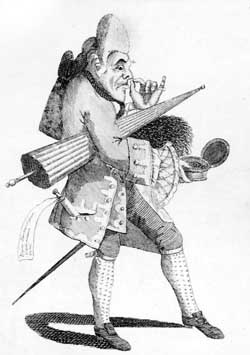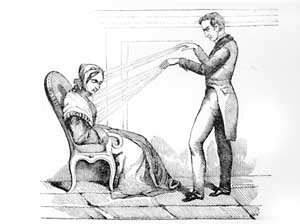Did quack
doctors contribute in a positive way to the advancement of medicine?
|

|
|
A quack doctor dispensing his potions
|

|
A quack doctor mesmerising his patients
(c.1840)
|
the word 'quack' comes from
'quacksalver', which meant someone who sold salves and other healing
remedies by fast-talking patter or 'quacking'. Many were not doctors of
course, but travelling salesmen, who went from village to village. they
disappeared long before their customers found that medicines were
worthless. Sometimes cures were advertised in newspapers.
People also used quacks as
even experienced doctors had little idea of what caused diseases. Much
medicine and surgery was ineffective or harmful. the necessity for
hygiene was not generally understood and people often died as a result
of surgery. there were so many different ideas about what caused illness
that it was difficult to discredit quacks. In spite of their
ineffectiveness, quacks survived because people who were desperately ill
would try anything to save themselves.
the arrival of chemists
meant that people could go and get better advice and more effective
remedies. Quacks disappeared when chemists' shops opened in most towns
as people became better informed about medicine and drugs. At the end of
the 19th century the drugs industry was established and sought to sell
drugs through legitimate channels.
Think about
this:
- Lack of knowledge about
medicine in the population helped to create opportunities for Quack
medicine men.
- Modern scientific method
in this period, created a surge in chemistry
- Availability of
information about new drugs gave people more choice and knowledge.
|